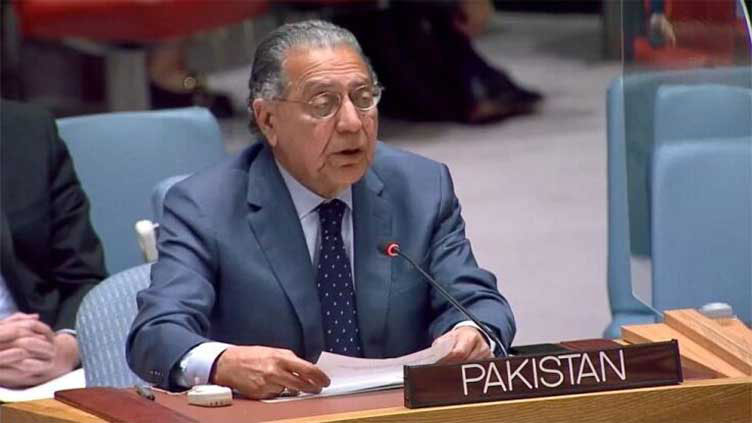Pakistan voices concern over violence in Syria

Pakistan
Syria must not become a safe haven for terrorism, Ambassador Munir Akram said
UNITED NATIONS (APP) - A top Pakistani diplomat told the UN Security Council Wednesday that a “strong and unified national security framework” in Syria was the key to ensuring the strife-torn country’s long-term stability and preventing external interference, as he voiced concern over the continuing violence in some of its parts.
“Syria must not become a safe haven for terrorism,” Ambassador Munir Akram said after UN Special Envoy for Syria Geir Pedersen and Assistant Secretary-General for Humanitarian Affairs Joyce Msuya briefed the 15-member Council on the political and humanitarian situation in the Arab country that is recovering from last November’s collapse of the al-Assad regime.
“We hope the new leadership will guide Syria toward peace, stability and prosperity,” he said.
At the same time, he emphasised the need for vigilance over the presence of foreign fighters and groups with known terrorist affiliation require, adding that any resurgence of Al-Qaeda, D’aesh and their affiliated groups must be prevented.
“We are also concerned at reports of the inclusion of foreign terrorist groups in Syria’s governing structure,” Ambassador Akram told delegates.
“No foreign fighters or armed entities such as those in North East Syria should operate outside the State’s control.”
In his briefing, Pedersen, the UN special envoy, acknowledged commitments made by Syria’s interim president Ahmad Al-Sharaa but stressed that Syrians across the country expect tangible actions.
“All Syrians I met…stressed to me how much they want institutional appointments, the transitional government, the provisional legislative body, the national dialogue process and any preparatory committees, and these need to be credible and inclusive,” he said.
The fragile security situation continues to threaten political progress, Pedersen warned, citing ongoing hostilities in the northeast, including daily clashes, artillery exchanges, and airstrikes that are impacting civilians and infrastructure.
A recent wave of car bombings in residential areas has caused significant casualties, he said.
While welcoming initial dialogue between caretaker authorities and the Kurdish-led Syrian Democratic Forces (SDF) in the northeast, he urged the United States, Turkiye, and regional and national actors to work together on “genuine compromises” that enable peace and stability.
“It is crucial that all doors remain open to ensuring the inclusion of all parts of Syria and all key constituencies within the political transition,” he added.
Concerns are also growing over economic stability against a backdrop of sanctions, widespread poverty and sudden donor cuts to humanitarian aid.
In his remarks, Ambassador Akram, Pakistan’s permanent representative to the UN, said Israel’s continued military actions and its declared intent to maintain an indefinite presence in the ‘Areas of Separation’ are blatant violations of the 1974 Disengagement Agreement.
“These illegal actions must be condemned, and Syria’s territorial integrity must be upheld, including through Israeli withdrawal from the ‘Areas of Separation’ as well as the Occupied Golan Heights.”
“The humanitarian situation remains dire,” he said, noting that over 16.5 million Syrians require urgent assistance, making this one of the worst humanitarian crises in recent history.
Food insecurity, a collapsing healthcare system, and a struggling education sector require immediate international attention and support, the Pakistani envoy said. Yet, he pointed out that humanitarian funding remains severely inadequate, and urged the international community to step up its efforts to meet Syria’s urgent humanitarian needs and support long-term recovery.
“Sanctions remain a major obstacle to Syria’s recovery,” he said, and called their reassessment and review.
“A balanced and pragmatic approach is needed to address economic hardships and the humanitarian crisis.”
In conclusion, Ambassador Akram said, “The path to peace and stability in Syria requires a credible political transition, national unity and an inclusive governance framework.
“The international community must remain engaged and constructive in supporting this process. Pakistan stands firmly with the brotherly and resilient people of Syria.”


